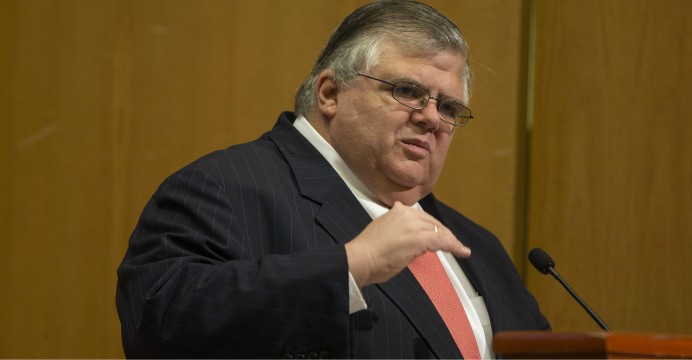

The head of the Bank for International Settlements (BIS), Agustín Carstens, thinks that nation-state banks may soon be issuing their own digital currencies.
In the same week he told top central banks to “preserve your ammunition”, the general manager told the Financial Times that his organisation supported the efforts of the world’s central banks in creating digital versions of their own state currencies.
The central banking heavyweight admitted that “many central banks are working on it” and the BIS is “supporting them”.
“It might be that it is sooner than we think that there is a market, and we need to be able to provide central bank digital currencies.”
A number of central banks – including Sweden’s Riksbank – are currently working on their own implementations of digital currencies that are based on what is known as ‘distributed ledger technology’, which would work by offering the public direct and auditable access to state-backed central bank money.
The BIS said in a recent statement on digital currencies that coins backed by tech giants could “rapidly establish a dominant position” in global finance and pose a potential threat to competition, stability, and social welfare.
Mr Carstens said: “The issue is how will the currency be used? Will there be discovery of information, or data that can be used in credit provision? And how will data privacy be protected?
“A very simple way to regulate this is to start with anti-money laundering rules. That is a very immediate and very obvious concern.”
However, the former Bank of Mexico governor admitted that developments in the rest of the currency market would influence the extent to which central banks pursued their own stablecoin projects.
In the past, central bankers – including Mr Carstens – have been dismissive of public cryptocurrencies, viewing the likes of Bitcoin and Ethereum as purely speculative instruments that do not qualify as ‘money’ due to the volatility of their pegged value against the most widely used state currencies, such as the US dollar and the euro.
Co-founder of Fundstrat Global Thomas Lee commented on Mr Carstens’ comments, saying that “this reduces the influence of traditional banks” because the move could allow individuals to get fiat directly from central banks instead of via an intermediary chain of regional and then more locally focused financial services providers.
Lee added that central banks could move to a model where they “directly transmit monetary policy to individuals instead of relying on banks for lending”.
Agustín added: “There needs to be evidence for the demand for central bank digital currencies, and it is not clear that the demand is there yet.”
In what seemed like a pro-self-sovereignty statement, he concluded his FT interview by saying: “Perhaps people can do what they want by using electronic wallets provided by banks or fintech companies.”
For more news, guides, and cryptocurrency analysis, click here.
Denver, Colorado, 24th February 2025, Chainwire
Denver, Colorado, 20th February 2025, Chainwire
Washington, D.C., 18th February 2025, Chainwire
Dubai, UAE, 27th January 2025, Chainwire
Those who enter the market at this time may be surprised to hear that Bitcoin…
George Town, Grand Cayman, 22nd November 2024, Chainwire